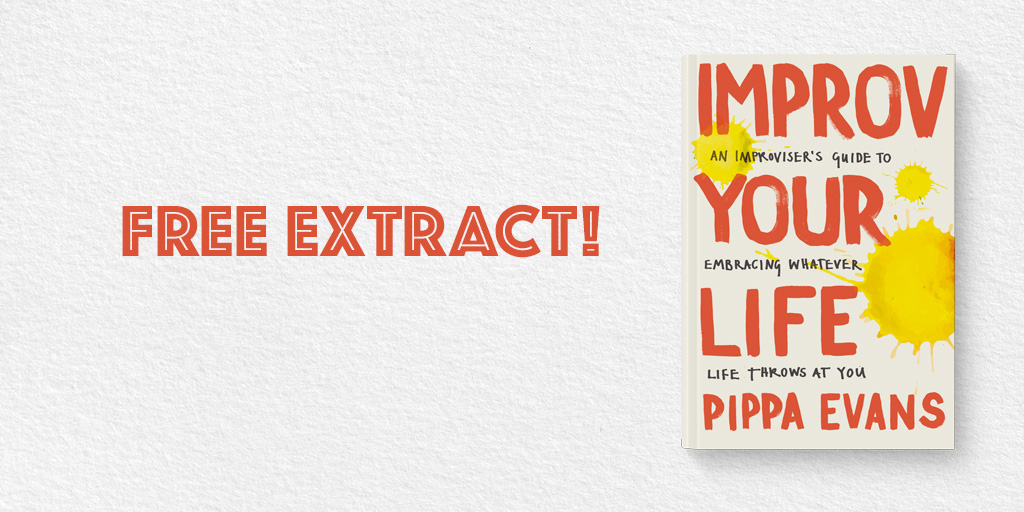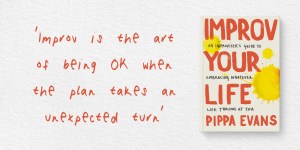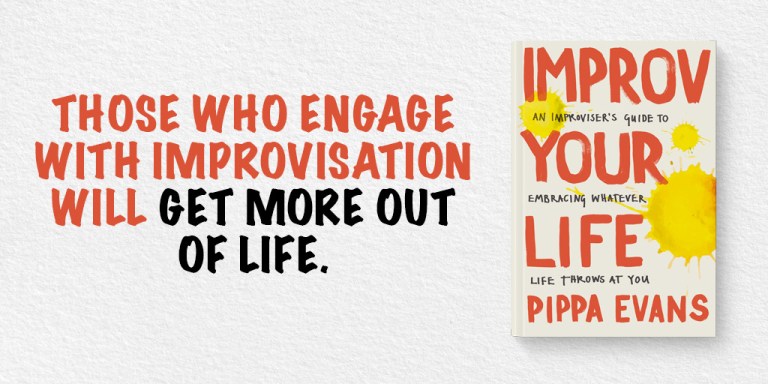Free Extract: Improv Your Life by Pippa Evans

An improviser’s guide to embracing whatever life throws at you!
PIPPA EVANS is an expert in saying Yes – and No. She’s a master of thinking on her feet, but has also had to learn how to go with the flow. In this book she’s passing on everything she’s learnt from her award winning improv career, as both a performer and teacher, so YOU can take centre stage in your own life.
In telling her story, delving into the craft of improvisation, and sharing fun exercises and practice you can do at home, Pippa will help you become fully yourself – realising your potential and ability to adapt to the ever changing world around you. It’s dangerous, being yourself, but let’s just take it one step at a time. Open the book, take a breath and get ready to say YES.
(If it’s a NO from you then perhaps consider buying for a friend, family member or enemy who you think needs some improv-ment)
WELCOME
Hello. I am Pippa Evans and I am an improviser. I teach it, I perform it and I LOVE IT. I do it on stage in the West End with Showstopper! The Improvised Musical, in tiny rooms above pubs with friends and over Zoom with my friends’ kids. I teach it to excited students, ready to play and explore, and in corporate boardrooms with less-enthusiastic-to-begin-with lawyers and marketing executives. I teach it at festivals all around the world, and I am fascinated by the ways in which improvisation can elicit the most extraordinary joy from a few people standing on a stage just listening and responding to each other.
You’ve probably heard of improvisation, or watched a clip of Whose Line Is It Anyway on YouTube, or had an awkward 30-minute drama lesson at school – where Mr Hargreaves tried to make you stand in front of the whole class and pretend to be a talking potato and you wanted to curl up and die. Or maybe your company forced you onto an away day which you thought was going to be all beer and raft-building but instead there were five actors wearing matching t-shirts and your ass clamped up. Sorry about that – I was probably one of those actors. If you’ve had a not-so-shiny experience with improv, I would like to assure you that it was simply a blip in the improv universe. Improv is the best, especially when you are doing it.
Why? Because the best improv experience is not had watching it (that is a different kind of magic). It is in the workshop space, where you are a part of the improvisation, rather than the audience enjoying the process. Great improvisation on stage is done by brilliant performers who also work as actors/writers/comedians/singers. What you are watching is a group of people who already have skills using the conduit of improvisation to create brilliant theatrical experiences. Which is why I believe improvisation should be studied by everyone – because it brings out the best in us all, no matter our profession, our status or our experience of the world. Those who engage with improvisation will get more out of life.
There.
I said it.
Are you still here?
Good.
If I had to release a manifesto, it would be that every child should have the opportunity to study improvisation from the age of ten until they leave school. Why ten? Because ten is when self-doubt and the outside world really start to creep into children’s brains. I was once teaching in a primary school where I did a workshop with every single year group from four years old to 11 years old and I loved it. I pretended to be butterflies with the littlest ones and played ‘Creating New Insults’ in the style of The Twits with the bigger ones (the best new insult was, ‘You look like a spaghetti face’). But what made me sad was seeing the cynicism starting to appear. ‘This is stupid,’ said one girl (if this had been an improv scene, she would have been smoking a cigarette and tapping ash onto another kid’s head), and her cynicism spread to half the class, who were then ashamed that they were actually quite liking it. And that cynicism is hard to shake, because we have been fed the lie that rejecting people’s offers and not joining in is the cool choice. You get more respect if you belittle others; if you stay in the safe zone and judge everyone else.
I know that feeling. I have to fight it every day. The wish to sneer so that you’re not left behind. I remember the first time I ever experienced improvisation and let that feeling stop me joining in. I was maybe eight years old and we were told there was a surprise for us waiting in the school hall. We were so excited! We lined up and got ready to go down the stairs, and when we walked in, we found a Scottish man with a big ginger beard. I grew up in London, so anyone who didn’t sound like they were selling apples or had plums in their mouth was mega exciting. He asked me, ‘How did you get to school today?’ and I said, ‘My mum drove me.’ And he said, ‘OK – now imagine a whole different way of getting to school!’ And I thought for a bit and I said, ‘I walked,’ and he said, with a slight wince, ‘OK, but how else might you have come to school today? If you could come any way at all?’ and I rolled my eyes, like I was too good for this crazy cat and said, ‘I don’t know, an elephant?’ and his eyes lit up and he said, ‘That’s right! An elephant! All the way from India!’, and he started stomping around the room like he was on an elephant. And I LOVED IT. But I pretended not to so that my class-mates wouldn’t think I was lame. And really, which is more lame? Oh sweet, little Pippa. How I wish I could shake you and say, ‘Ride the elephant!’ But I can’t, and to this day, I wish I could find that Scottish man, apologise profusely, and then ride off into the distance together on an imaginary elephant.
This here is something we have to turn our attention to. Not joining in, on the most basic level, because we are worried about what people might think. That is poison right there. Forget about sugar in fizzy drinks – worrying what people might think is what’s really killing us. It stops us taking part in so many moments when we know, deep down, that we want to. We feel the fizz in our bellies that we want to say something funny back in the staff room, but we don’t because it might not be funny out loud. We don’t dance at our friend’s wedding because we are self-conscious about our bodies being seen.
We fear people witnessing us being vibrant and free, in case there is a comment or a look that might hit us like a bullet and bleed that last tiny bit of confidence we were saving onto the dance floor and out of our lives.
Improv In Life
People often say, ‘I can’t believe you improvise for a living. I could never do that!’, to which I have to reply, ‘But you could. You do it all the time!’. Humans are brilliant improvisers without even noticing it.
When you go to get the train to work and the train is cancelled, what do you do? You improvise.
‘I’ll call Hardeep and see if I can get a lift.’ or
‘I’ll walk – it’s only three miles.’
or
‘I’ll pretend to work from home, but really eat Nutella out of the jar all day in my pants.’
I’m not here to judge how you live your life, just to help you navigate it more fully. Make sure you are enjoying each spoonful of that tasty, tasty chocolate spread.
When you go to the supermarket and there is no lettuce left (true story) so you have to re-plan your meal (even though you were really looking forward to that salad), that is improvising. It is using what is there, in the moment, and making something new.
‘No lettuce? Darn. I’ll have to have chips instead.’
Improvisation is a mystery to many people, because it is so tied up in its identity as a comedy show, rather than a skill in, and of, itself. So for this book, I would like to use the following definition for improvisation:
Improvisation is the art of using what is available to you in the moment.
Is it the best definition? I don’t know – are you the Oxford Dictionary? This definition works for me because the strongest improvisers are the ones who have unlimited access to everything they possess. ‘What is available to you’ means the people around you, the props on the table and the treasure trove that is yourself. Your thoughts, your words, your responses, your presence in the moment.
The best improvisers are not loud show-offs (not all of them, anyway) – they are curious and interested in the world around them. They want to expand their general knowledge, to be equipped for every scenario. They want to notice every detail, in case it tells them something new or interesting about a character they might play or a scenario they might find themselves in. The general principle of acceptance that runs through improvisation encourages the improviser to notice something rather than rush to judge it.
Improvisers often have varied but deep interests. Amongst my colleagues there is a deep knowledge of jazz, online gaming, alternative lifestyles, pottery, horror, musical theatre, folk music, the Bible, Warhammer and politics. Being interested in the world around you makes you interesting. Curiosity is contagious and fosters the realisation that life is about more than just ourselves. Life is about interacting with the world around us.
To be a top improviser you need, more than anything, to be curious. If you aren’t interested in the world or the people around you, then improv is not gonna be an easy place for you. But it can be a way to foster curiosity. And the first thing you need to be curious about is yourself.
Once you get inside yourself, you can get over yourself, and then you can connect to other people. To paraphrase our favourite drag queen:
‘If you can’t love you, how will you love anyone else?’ Which I always want to expand to:
‘If you don’t know yourself, how will anyone else?’ And in improv terms:
‘If you can’t say ‘yes’ to yourself, why would anyone else?’
Did you enjoy the free extract? Ready to start Improv-ing your life? Shop Improv Your Life now!
Publishing in Paperback, Ebook and Audiobook on February 18th 2021




